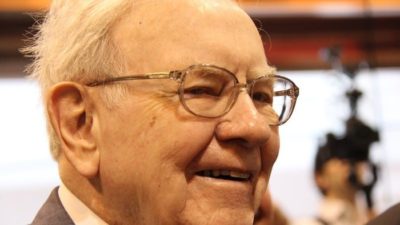The world's most successful investor, Warren Buffett, Chairman and CEO of Berkshire Hathaway (NYSE: BRK-A, BRK-B) overnight unveiled a significant new holding: a US$10.5 billion holding in IBM (NYSE: IBM).
If you've followed Buffett for any length of time, you're entitled to a double-take. After all, Buffett was the man decried as being 'past it' for sitting on the sidelines when the tech boom was in full swing.
Then when the boom went bust, Buffett was hailed for his discipline in not being swept up in the excitement of those years.
An investor in decline?
He famously avoids – or we should now say avoided – technology companies. The man who studiously remains within his circle of competence has made his first foray into that area with the purchase of just over 5% of the shares in the company known as 'Big Blue'.
Has Buffett finally lost his famous self-discipline? Has he run out of options in areas he favours?
IBM is obviously a technology company, but the Oracle of Omaha has been reading IBM's annual report for over 50 years. Until now, he hasn't felt comfortable enough with the business – at a price he felt was attractive enough – to take a stake.
There are two key reasons for the purchase that Buffett mentioned when he unveiled his purchases on CNBC overnight, our time.
Circle of competence
First, Buffett has always strived to enlarge his circle of competence. As a kid, he played with model railways, and was always interested in the rail sector. Despite that, it took more than 50 years of investing before Buffett felt he knew enough – and on self reflection, noticed his own blind spot – before plunging in to buying a major US railroad outright.
The lesson: Buffett stays within his circle of competence, enlarges it when he can, even if it takes an investing lifetime.
Competitive advantage
Secondly, while IBM is a technology business at heart, it has become much more than just a PC maker.
No longer producing and selling computers for consumers, the company has reoriented itself around providing technology services. The company creates deep and long lasting relationships with its business customers, helping them integrate and manage their technology infrastructure.
Their customers are often high-spending and are willing to pay IBM to deliver efficiencies in their IT budgets. IBM has very high customer loyalty, great brand recognition and has a management team who think like owners. The brand may not resonate with consumers in the way it once did, but in the business world, IBM's brand still means a lot.
The lesson: To Buffett, 'stickiness' – strong brands, loyal customers and repeat business – matters a lot. Brands are most often considered from a consumer perspective, but business brands are just as important.
Avoid pigeonholes
Warren Buffett is often characterised as an old-fashioned investor – sometimes as a criticism, and often as a compliment. I think that characterisation sells him a long way short.
Buffett's success has come from thinking deeply about the fundamental economics of companies and the industries in which they compete. Once he has a solid understanding of what gives a business a competitive advantage, he is prepared to take a position.
Many, many times Buffett decides he either cannot sufficiently predict the long term economics of a company or industry, or that where he can predict them, no company has a sufficient advantage (or is available at a cheap enough price) to be worthy of his investment.
Foolish take-away
If Warren Buffett is old-fashioned in any way, it is in his patience and commitment to his investing strategy. When the times don't suit him, he simply bides his time. Then, when the planets align, he has read and thought enough to be ready to strike quickly.
When he has chosen to avoid technology companies in the past, it was not out of pig-headedness, but simply because he felt it was a sector about which he didn't know enough.
A dozen years after the tech crash, the Oracle of Omaha found himself in a position of now feeling he knew enough about IBM, whose shares were trading at an attractive price – a simple combination was the reward for decades of patience and self discipline.
Are you looking for more quality stock ideas? Readers can click here to request a new free report titled The Motley Fool's Top Stock For 2012.
Scott owns shares in Berkshire Hathaway. The Motley Fool's purpose is to educate, amuse and enrich investors. This article contains general investment advice only (under AFSL 400691). Authorised by Bruce Jackson.








